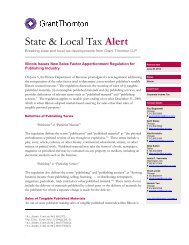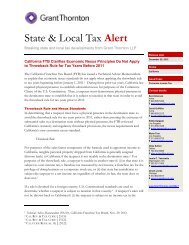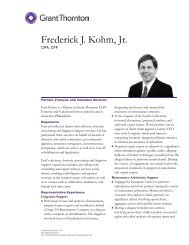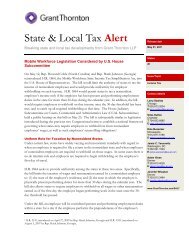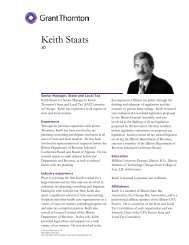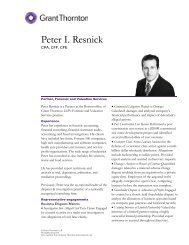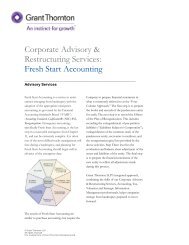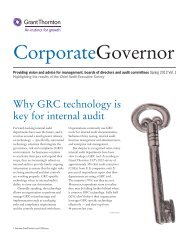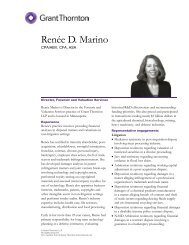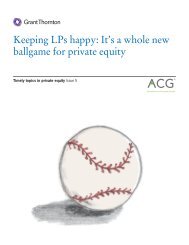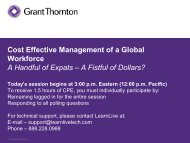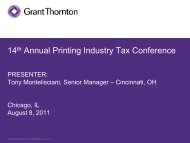State & Local Tax Alert - Grant Thornton LLP
State & Local Tax Alert - Grant Thornton LLP
State & Local Tax Alert - Grant Thornton LLP
You also want an ePaper? Increase the reach of your titles
YUMPU automatically turns print PDFs into web optimized ePapers that Google loves.
<strong>State</strong> & <strong>Local</strong> <strong>Tax</strong> <strong>Alert</strong><br />
Breaking state and local tax developments from <strong>Grant</strong> <strong>Thornton</strong> <strong>LLP</strong><br />
Missouri Administrative Hearing Commission Holds Intercompany<br />
Dividends are Excluded from Sales Factor Denominator<br />
On October 17, the Missouri Administrative Hearing Commission (AHC) held that<br />
dividends paid to a parent corporation and its subsidiaries by affiliates that were part of<br />
the same consolidated group were required to be excluded from the sales factor<br />
denominator because the facts failed to determine the amount of dividends that arose<br />
from operations in Missouri, and the inclusion of dividends only in the sales factor<br />
denominator would prevent the fair operation of the apportionment formula. 1<br />
Background<br />
The taxpayer, a Missouri holding company that provided telecommunication services<br />
through its subsidiaries, elected to file a Missouri consolidated income tax return 2 with its<br />
subsidiaries using a three-factor method of income apportionment for a short taxable year<br />
beginning May 18, 2006 and ending December 31, 2006. For purposes of apportionment,<br />
the taxpayer included $1,276,822,176 in dividends paid to the taxpayer and its subsidiaries<br />
by other affiliated companies (local exchange carriers) in the consolidated group in its sales<br />
apportionment denominator. The taxpayer recorded these dividends as “cash<br />
distributions” which were not considered to be the sales of goods or services by the payers<br />
or recipients.<br />
In 2008, the Missouri Department of Revenue’s Field Compliance Bureau (“Bureau”)<br />
began an audit of the taxpayer’s 2006 tax year and adjusted the sales factor denominator to<br />
exclude the dividends paid by affiliates from the sales factor denominator. The Bureau<br />
issued a Notice of Deficiency, assessing an additional amount of $74,924.45 (including<br />
interest and penalties), the vast majority of which was a result of the audit adjustment that<br />
excluded the dividends paid by affiliates from the sales factor denominator. The taxpayer<br />
appealed the Notice directly to the AHC. The sole issue before the AHC was whether the<br />
dividends paid by the taxpayer’s affiliated companies should be included in the sales factor<br />
denominator.<br />
Release date<br />
December 6, 2012<br />
<strong>State</strong>s<br />
Missouri<br />
Issue/Topic<br />
Corporation Income <strong>Tax</strong><br />
Contact details<br />
Carolyn Harpole<br />
St. Louis<br />
T 314.735.2121<br />
E carolyn.harpole@us.gt.com<br />
Roy Tegenkamp<br />
Kansas City<br />
T 816.412.2629<br />
E roy.tegenkamp@us.gt.com<br />
Giles Sutton<br />
Charlotte<br />
T 704.632.6885<br />
E giles.sutton@us.gt.com<br />
Jamie C. Yesnowitz<br />
Washington, DC<br />
T 202.521.1504<br />
E jamie.yesnowitz@us.gt.com<br />
Chuck Jones<br />
Chicago<br />
T 312.602.8517<br />
E chuck.jones@us.gt.com<br />
Hannah Yoo<br />
Chicago<br />
T 312.602.8338<br />
E hannah.yoo@us.gt.com<br />
www.<strong>Grant</strong><strong>Thornton</strong>.com/SALT<br />
1 Embarq Corp. v. Department of Revenue, Missouri Administrative Hearing Commission, No. 10-1485<br />
RI, October 17, 2012.<br />
2 The affiliated companies participating in the Missouri consolidated income tax return were<br />
identical to the companies participating in the taxpayer’s federal consolidated return.
<strong>Grant</strong> <strong>Thornton</strong> <strong>LLP</strong> - 2<br />
Dividends Not Included in Sales Factor Denominator Under Intercompany<br />
Transaction Regulation<br />
A Missouri regulation defines the term “sales and business transactions” to include all<br />
intercompany sales (business transactions as defined in Treas. Reg. Section 1.1502-13<br />
(relating to federal consolidated reporting of intercompany transactions). 3 Relying on this<br />
regulation, the taxpayer argued that the dividends from affiliates were distributions with<br />
respect to stock between members of the same consolidated group, and as a result, they<br />
constituted “intercompany transactions” that should be included in the sales factor<br />
denominator.<br />
Since the issue raised by the taxpayer was a matter of first impression in Missouri, the<br />
AHC considered precedent from other states. The AHC ultimately gave weight to a<br />
Florida court decision to determine that dividends were not includable in the sales factor<br />
denominator under the regulation relied upon by the taxpayer. The Director had<br />
presented the AHC with Department of Revenue v. Anheuser-Busch, Inc. 4 due to the fact that<br />
Florida had a similar intercompany transaction regulation. In Anheuser-Busch, Inc., the<br />
transactions were deemed intercompany transactions because there were indicia of sales,<br />
such as an invoice from the subsidiary to the parent company and delivery of the sold<br />
items from the subsidiary to the parent company. In the present case, however, the<br />
taxpayer recorded the dividends as cash distributions, and not the sales of goods or<br />
services. Due to this distinction, the AHC found that the dividends were not includable in<br />
the sales factor denominator as “intercompany transactions” under the regulation cited by<br />
the taxpayer.<br />
Inclusion of Dividends in Sales Factor Denominator Resulted in Unfair<br />
Apportionment<br />
While the dividend was not includible pursuant to the regulation addressing intercompany<br />
transactions, a second regulation addressing exceptions and special rules applicable to the<br />
sales factor was analyzed as well. 5 Under this regulation, the Department contended that<br />
the income from the dividends resulted from the mere holding of intangible personal<br />
property and could not be attributed to any particular income-producing activity of the<br />
taxpayer. As such, the dividend income could not be includible in the sales factor<br />
denominator. The taxpayer argued that this exclusion rule only applied to passively held<br />
stocks or stocks that are “merely held” and not to its dividends, which were business<br />
income from income-producing activities.<br />
To bolster its argument, the taxpayer presented Legal Ruling 2003-3 issued by the California<br />
Franchise <strong>Tax</strong> Board (FTB). 6 In that ruling, the FTB was confronted with regulatory<br />
language that was very similar to the regulatory language at issue and decided that business<br />
3 MO. CODE REGS. ANN. tit. 12, § 10-2.045(19).<br />
4 Department of Revenue v. Anheuser-Busch, Inc., 527 So.2d 877 (Fla.1 st DCA 1988).<br />
5 MO. CODE REGS. ANN. tit. 12, § 10-2.075(43) and (57); MO. CODE REGS. ANN. tit. 12, § 10-<br />
2.075(64)(C).<br />
6 Franchise <strong>Tax</strong> Board Legal Ruling 2003-3, December 4, 2003.
<strong>Grant</strong> <strong>Thornton</strong> <strong>LLP</strong> - 3<br />
income dividends were gross receipts as long as they represent more than just the holding<br />
of intangible property. Applying this ruling to the case at hand, the AHC found that the<br />
taxpayer’s participation in management and operations of other affiliated companies<br />
showed that the dividends were gross receipts qualified to be included in the sales factor<br />
denominator under the specific regulatory provisions addressing income-producing<br />
activity.<br />
However, the Department also contended that including the taxpayer’s dividends in the<br />
sales factor denominator would effectuate unfair apportionment under the regulations. 7<br />
Pursuant to this argument, the Missouri-sourced dividends could not be separately<br />
identified since there were not enough facts to establish the dividends that arose from<br />
operations taking place in Missouri versus operations taking place elsewhere, and as such,<br />
this prevented fair apportionment. The AHC agreed with the Department’s position,<br />
excluding the dividends from the sales factor denominator, and upheld the assessment<br />
against the taxpayer.<br />
Commentary<br />
Missouri permits taxpayers, under certain circumstances, to include the effect of<br />
intercompany transactions in the sales factor. In this case, however, the AHC denied<br />
application of the intercompany transaction regulation used by the taxpayer in support of<br />
its argument. While this regulation was unavailable to the taxpayer, the AHC ultimately<br />
based its exclusion of the dividends from the sales factor on a different ground. The lack<br />
of factual support to identify the dividends that arose from Missouri operations, and<br />
therefore, the inclusion of dividends in the sales factor denominator, prevented the fair<br />
apportionment of income in the eyes of the AHC.<br />
Significantly, the AHC appears to suggest that had the taxpayer been able to separately<br />
identify the dividends arising from Missouri, the taxpayer would have been able to include<br />
the dividends in the apportionment factor. This would have been a positive development<br />
for the taxpayer if the dividends could be sourced entirely outside of Missouri, as the<br />
inclusion of such dividends solely in the denominator of the sales factor would have<br />
reduced the taxpayer’s apportionment percentage to Missouri.<br />
The information contained herein is general in nature and based on authorities that are subject to change.<br />
It is not intended and should not be construed as legal, accounting or tax advice or opinion provided by<br />
<strong>Grant</strong> <strong>Thornton</strong> <strong>LLP</strong> to the reader. This material may not be applicable to or suitable for specific<br />
circumstances or needs and may require consideration of nontax and other tax factors. Contact <strong>Grant</strong><br />
<strong>Thornton</strong> <strong>LLP</strong> or other tax professionals prior to taking any action based upon this information. <strong>Grant</strong><br />
<strong>Thornton</strong> <strong>LLP</strong> assumes no obligation to inform the reader of any changes in tax laws or other factors that<br />
could affect information contained herein. No part of this document may be reproduced, retransmitted or<br />
7 MO. CODE REGS. ANN. tit. 12, § 10-2.075(43).
<strong>Grant</strong> <strong>Thornton</strong> <strong>LLP</strong> - 4<br />
otherwise redistributed in any form or by any means, electronic or mechanical, including by photocopying,<br />
facsimile transmission, recording, re-keying or using any information storage and retrieval system without<br />
written permission from <strong>Grant</strong> <strong>Thornton</strong> <strong>LLP</strong>.<br />
<strong>Tax</strong> professional standards statement<br />
This document supports the marketing of professional services by <strong>Grant</strong> <strong>Thornton</strong> <strong>LLP</strong>. It is<br />
not written tax advice directed at the particular facts and circumstances of any person. Persons<br />
interested in the subject of this document should contact <strong>Grant</strong> <strong>Thornton</strong> or their tax advisor<br />
to discuss the potential application of this subject matter to their particular facts and<br />
circumstances. Nothing herein shall be construed as imposing a limitation on any person from<br />
disclosing the tax treatment or tax structure of any matter addressed. To the extent this<br />
document may be considered written tax advice, in accordance with applicable professional<br />
regulations, unless expressly stated otherwise, any written advice contained in, forwarded with,<br />
or attached to this document is not intended or written by <strong>Grant</strong> <strong>Thornton</strong> <strong>LLP</strong> to be used,<br />
and cannot be used, by any person for the purpose of avoiding any penalties that may be<br />
imposed under the Internal Revenue Code.




